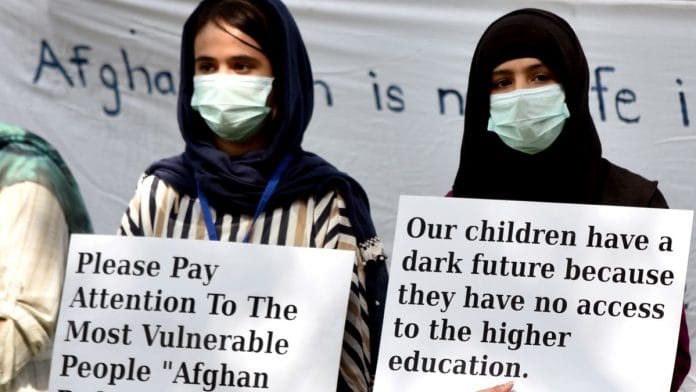New Delhi: Following Taliban’s takeover of Afghanistan and the collapse of the Ashraf Ghani government, the Islamic group said in a press conference Tuesday that their government will uphold women’s rights within the rules of Sharia law.
“[Women] are going to be working shoulder to shoulder with us. We would like to assure the international community that there will be no discrimination,” Taliban spokesperson Zabihullah Mujahid said, according to USA Today.
While the Taliban said they have permitted women to continue attending school and university and added that women will not be required to don a full burqa, they said that the wearing of hijabs will remain compulsory.
However, media reports of surging burqa prices and a woman being killed for refusing to cook for Taliban fighters contradict the group’s public assertions. Other recent killings have also led to heightened scepticism and fear of the Taliban’s intentions with regards to human rights.
Moreover, in view of the history of brutality under Taliban’s previous regime in the late 1990s, a myriad of questions have arisen over the concept of Sharia law and what it means for the future of Afghans, particularly women.
Also read: From Mazar to Kabul, I saw Afghanistan fall to Taliban in 10 days
What is Sharia? How is it applied in modern context?
According to Merriam Webster, the word ‘Sharia’ comes from the Arabic term ‘sharīʽa’ and is defined as “Islamic law based on the Quran”, Islam’s central holy text.
Such a definition, however, does not address the varying interpretations of the Quran’s contents and the different legal applications of Sharia in different Islamic theocracies and democracies around the world.
According to Asifa Quraishi-Landes, an Islamic law professor at the University of Wisconsin-Madison in the US, Sharia itself is considered as a set of Quran-based guidelines “that point Muslims towards living an Islamic life”.
Human interpretations are termed Fiqh, meaning “understanding”, while another legal term, Siyasa, is related to Islamic political authority.
“Fiqh is not designed to help governments police morality in the way, say, Saudi Arabia does today. According to classical Fiqh scholarship, a Muslim ruler’s task was to put forth another type of law, called Siyasa, based on what best serves the public good,” Quraishi-Landes wrote in a 2016 article in the Washington Post.
However, the traditional definitions are not in line with the present day application of these concepts, with the terms often being used interchangeably, including by Islamic political leaders in places like Saudi Arabia, Egypt and now Afghanistan.
Quraishi-Landes holds European colonialism responsible for this contemporary blurring of the lines between Sharia, Fiqh and Siyasa, which, she says, has played a similarly pivotal role as Sharia itself in formulating the legal systems in Islamic theocracies.
“France, England and others imposed nation-state models on nearly every Muslim-majority land, inadvertently joining the crown and the faith. In pre-modern Muslim lands, fiqh authority was separate from the governing authority, or siyasa. Colonialism centralized law with the state, a system that carried over when these countries regained independence,” Quraishi-Landes said.
Also read: These Afghans came to Kabul to escape Taliban terror. Now they wish they hadn’t
Where do women figure in Sharia?
In an article in The Conversation, Islamic Studies professor Asma Asfaruddin wrote that Sharia recognises “the absolute equality of men and women as human beings and proclaims that they are each other’s partners in promoting the common good”.
According to Asfaruddin, Sharia “provides women with certain rights that were practically unheard of in the premodern world”. These rights include education, divorce, abortion and property inheritance.
In May this year, Politics and Legal Studies professor Mark Fathi Massoud wrote about how women in Somalia and Somaliland whom he interviewed were using Sharia to promote feminism.
In her article, Asifa Quraishi-Landes too aimed to dispel notions about Sharia being inherently misogynistic by saying that laws like Saudi Arabia’s now-removed ban on women drivers “have no basis” in Fiqh. However, she clarified that “patriarchal rules exist” in Fiqh, which have been enforced through oppressive laws in Islamic theocracies.
What is Taliban’s interpretation of Sharia?
However, the Taliban’s interpretation of the Islamic law is on the other end of the spectrum, with an abhorrence for equality of women and violence against them.
In 2019, The Guardian published interviews with Afghan women on their experiences under the previous Taliban rule, which were largely defined by heavy policing of what women wore, a blanket ban on their education, jobs and sport, and harsh corporal punishments on those who failed to comply.
In view of this history, many Afghan women are not falling for the Taliban’s press statements in the last week expressing support for women’s rights, reported USA Today.
“Women are very cynical, and they’re dismissing this and saying it’s just a PR stunt. The proof will be in the eating of the pudding, whether, in fact, they do mean it,” Islamic Studies professor Akbar Ahmed told USA Today.
Afghan women are also preparing for the worst case scenario. For instance, the now Copenhagen-based former captain of the Afghan women’s national football team reportedly appealed to all Afghan sportswomen to “remove all traces of their sporting history”.
An Afghanistan men’s national footballer also expressed similar fears, in an interview with a Polish publication.
(Edited by Amit Upadhyaya)
Also read: Taliban ‘conducting raids, door-to-door searches’ at vacant Indian Embassy, consulates






